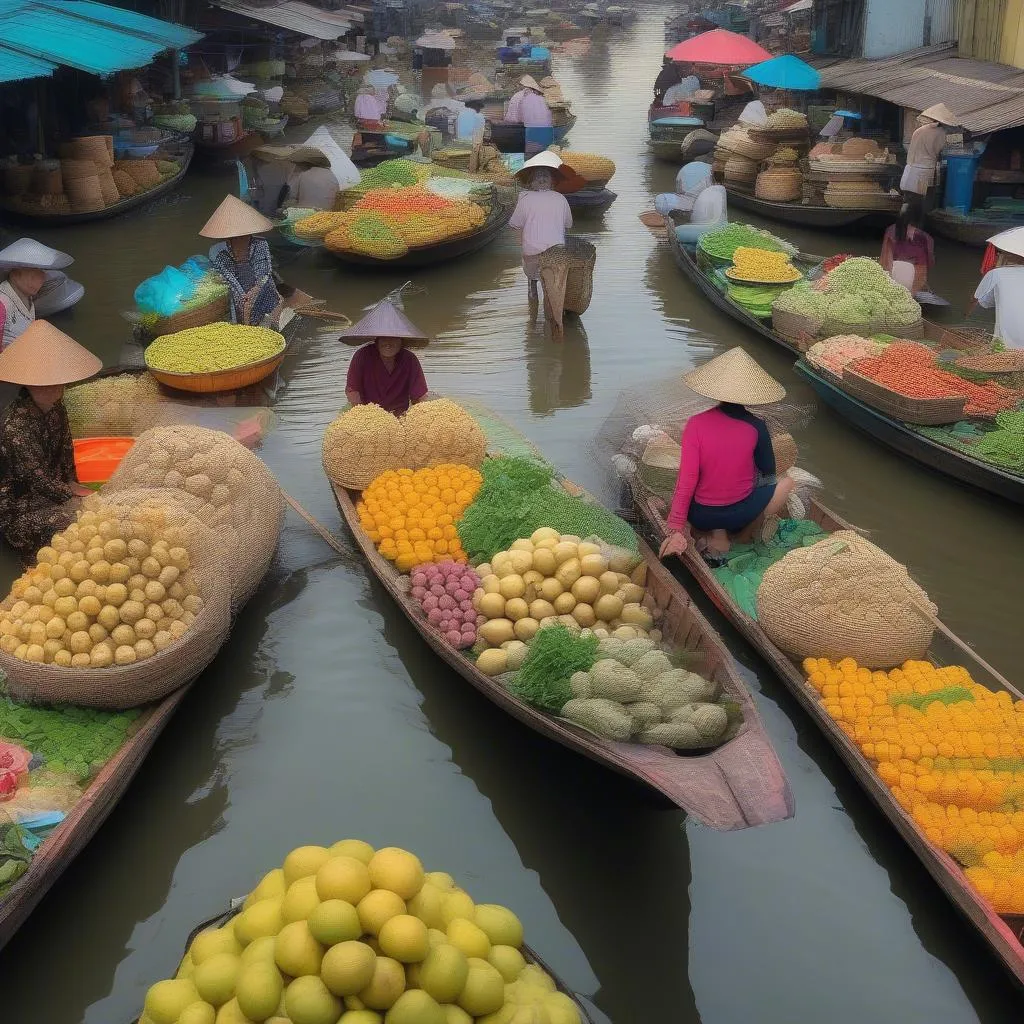“Can Tho, oh Can Tho! A city of rivers and floating markets, where the air is sweet with tropical fruits and life moves at a different pace.” At least, that’s what everyone who visits tells me. But they also always ask: “When is the best time to go?”
Well, my friends, like a perfectly ripe mango, Can Tho is delightful year-round. However, to savor its full flavor, you need to pick the right time to visit. Let’s dive into the seasons of this Mekong Delta gem!
Can Tho’s Climate: A Tropical Tango
Can Tho enjoys a tropical climate with two distinct seasons: wet and dry. But don’t let the word “wet” scare you off – even during the rainy season, downpours are usually brief and followed by sunshine.
The Best Time to Visit: Catching the Highlights
Dry Season (November – April): This is peak season for a reason! The weather is sunshine-filled, with cooler temperatures, ideal for exploring the bustling Cai Rang Floating Market or taking a boat trip through the enchanting canals.
Wet Season (May – October): Don’t discount the rainy season! While you might experience some showers, the landscapes are lush and vibrant. Plus, you’ll encounter fewer crowds and potentially snag better deals on accommodations.
A Seasonal Guide to Can Tho
Dry Season (November – April): Sunshine and Celebrations
- November – February: The coolest months, perfect for exploring the outdoors without breaking a sweat. Witness the vibrant flower markets bursting with color as Tet, the Vietnamese New Year, approaches.
- March – April: Temperatures and humidity rise slightly, but it’s still an excellent time to visit. Experience the lively atmosphere of the Khmer New Year in April.
Wet Season (May – October): Lush Landscapes and Local Charm
- May – June: Early wet season means occasional showers, but the rice fields are a stunning emerald green. Savor juicy mangoes and other tropical fruits in their prime.
- July – August: Rainfall is at its peak, but don’t be deterred! Embrace the slower pace of life, enjoy delicious local cuisine, and experience the floating markets in a different light.
- September – October: Rainfall decreases, making it a good time for photography enthusiasts to capture the dramatic skies and reflections on the waterways.
 Cai Rang Floating Market
Cai Rang Floating Market
Planning Your Trip
Getting There and Around
Can Tho International Airport (VCA) connects the city with major destinations in Vietnam and internationally. Buses and taxis are readily available for getting around the city and exploring nearby attractions. For a truly authentic experience, consider renting a motorbike or bicycle.
Accommodation
Can Tho offers a range of accommodation options to suit every budget, from cozy guesthouses to luxurious hotels. Consider staying near the Ninh Kieu Wharf area for easy access to restaurants, shops, and attractions.
What to Pack
Pack light, breathable clothing, comfortable walking shoes, a hat, sunscreen, insect repellent, and a raincoat or umbrella (just in case!).
Don’t Miss These Experiences
- Cai Rang Floating Market: Witness the magic of this bustling market, where boats laden with fruits, vegetables, and local delicacies create a kaleidoscope of colors.
- Bang Lang Stork Garden: Be mesmerized by thousands of storks returning to their nests at sunset.
- Ninh Kieu Wharf: Take a stroll along the riverfront, enjoy the city views, and indulge in some street food.
- Ancient House Binh Thuy: Step back in time at this beautifully preserved 19th-century house.
 Bang Lang Stork Garden
Bang Lang Stork Garden
Tips from a Travel Pro
- Embrace the Mekong Delta pace: Life moves a little slower here. Relax, soak in the atmosphere, and enjoy the journey.
- Try the local cuisine: Don’t miss out on specialties like Bun Ca (fish noodle soup), Hu Tieu My Tho (noodle soup), and the abundance of fresh seafood.
- Learn a few basic Vietnamese phrases: It’ll go a long way in enhancing your interactions with the friendly locals.
FAQs
Q: What is the currency in Can Tho?
A: The currency in Vietnam is the Vietnamese Dong (VND).
Q: Do I need a visa to visit Can Tho?
A: Visa requirements vary depending on your nationality. Check with the Vietnamese embassy or consulate in your home country for the latest visa regulations.
Embrace the Magic of Can Tho
No matter when you decide to visit Can Tho, this charming city is sure to captivate your senses. From the vibrant floating markets to the serene canals, Can Tho offers a unique glimpse into the heart of the Mekong Delta. So, pack your bags, grab your sense of adventure, and get ready to create unforgettable memories in this captivating corner of Vietnam!
Want to learn more about Can Tho and other exciting destinations in Vietnam? Visit travelcar.edu.vn for travel tips, itineraries, and inspiration!